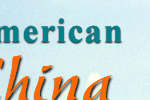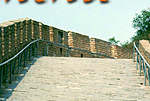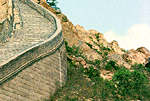 |
 |
 |
 |
 |
 |
 |
 |
 |
 |
 |
 |
 |
 |
 |
 |
|
July 3, 2001 Sailing Towards World SignificanceLast Tuesday, June 25th, marked the 80th anniversary of the founding of the Chinese Communist Party. Chinese from Beijing to Kashgar put on their finest slacks and ties, spent extra money at the barber shop and went to the local danwei recreation center to sing songs of praise. |
|
I was watching the most recent music video advertisement for Beijing’s 2008 Olympic bid, marveling at the lyrics sung by Jackie Chan, Gong Li and other notables: "3000
years of history when my television went fuzzy and suddenly I was watching amateur footage of the afternoon’s singing at Southwest Agricultural University, my danwei, I suppose. The lyrics were older and better known – all Chinese students wake up and sing them before they go to school – but the main theme is the same: "Without
the Communist party There is indeed a new China and a new Beijing. The Olympics certainly supplied the catalyst to clean up the city and address the city's problems: garbage, dust, traffic congestion and inadequate water facilities. Whether or not the Communist party is a prerequisite for a new China is highly questionable – but the fact remains that 80 years ago China was carved up and on its knees. Today China is reaching across borders while opening its own, flexing economic muscles, and exerting growing influence in troubled areas like the Balkans and Iraq. Some examples of the New China: THE UZBEKS ARE COMING!Four years ago, a troupe of 20 Uzbek dancers received one-year visas from the Chinese government so they could perform high-kick, high-energy ethnic dances in Shenzhen, Guangdong Province. Now, they are split into groups of five to six and they tour the country, bouncing from one seedy club to another making money and introducing Central Asia to the East. Every year Duarsin and Ablekim return to Uzbekistan to recoup, renew visas and exchange renmenbi into greenbacks. Uzbek currency is worthless pretty much anywhere – it can’t be converted into foreign currency and most Uzbeks buy bread with rubles. They return in January to China with their three dancing partners, or "wives," and get a gig for a few weeks. The five of them get paid 1,800 renmenbi a night, food and lodging are paid for, and drinks are usually on the house as well. In Guangdong, there are hundreds of such acts – Turkish, Uzbek, Romanian, Russian – and the crowd appreciates them and gets a kick out of the folk-techno fusion and crazy clothes and high-pitched yelps that make up the show. But in Chongqing Province and Chengdu, Sichuan Province, Chinese customers don’t know what to make of the "Russians." Although Sichuan is much closer to Xinjiang, where Turks hide behind every kebab stand, the Chinese here know nothing of Uzbek ulture. The Uzbeks consider themselves, and the Uighers, and the Kashgaris, to be members of one big Turkestan – from Urumqi to Istanbul. Conversations sometimes got heated after a few bottles of Blue Sword Lager. When Duarsin told the club’s boss not to cheat his "Xinjiang brothers, who are Turks," the boss retorted, "How could I cheat my fellow Chinese?" Things ended peacefully amid backslaps and ganbei’s and the newly formed Shanghai Cooperation Organization aims to keep things that way. The SCO is the first step by the New China to create an alliance between three old enemies. Uzbekistan is the SCO’s newest member and hopes to benefit from stronger economic and trade relations with China and Russia. China is the strongest of the six-nation group in terms of economic growth, which includes powerhouses like Kazakhstan, Kyrgyzstan, and Tajikistan. The -stans see a chance to develop their mineral and oil reserves through cooperation with the two bigger countries, as well as political support and recognition from two permanent members of the United Nations Security Council. China also has economic interests, aside from the development of oil, in the smaller countries – Xinjiang is reported to have vast mineral and oil resources, all untapped and inaccessible … and Central Asian dancers are getting real popular. But the real impetus for the cooperation is border control and crime prevention. In April 1996, the top leaders of SCO members (sans Uzbekistan) met for the first time in Shanghai and signed a Treaty on Deepening Military Trust in Border Regions. The next year, in Moscow, the leaders signed the Treaty on Reducing Military Forces in Border Regions. With Taliban soldiers training Muslim fighters, Tajik rebels crossing over into Kyrgyz territory and Uigher dissidents blowing up cars every Spring Festival, both China and Russia see a need for an anti-terrorist organization to keep the peace and keep the borders intact. The differences between Duarsin, Ablikem and their audience are striking and underline the need for China to address its Xinjiang population. The languages are different and so far not a single Han Chinese the Uzbek dancers have met can understand the language spoken by a – shrinking – majority in Xinjiang. Initial contact between the Turks and the Chinese seems very cautious: the language of communication is smiling Mandarin, with both sides turning to local Sichuan dialects and Turkish for serious intra-clan consultation. |
Text-only printable version of this article Sascha Matuszak
is a teacher living and working in China. His articles have appeared
in the South China Morning Post, the Minnesota Daily,
and elsewhere. His exclusive Antiwar.com column appears Tuesdays. Archived columns Sailing
Towards World Significance China's
Youth Revolution |
CHINESE EAT PORK – TURKS DON’TVersions of history differ greatly: Chinese students refer to the Yuan dynasty – the one installed by Kublai Khan, son of the Ghengis Khan – as the largest extent of the Chinese Empire. Xinjiang was merely a Chinese territory overrun by hairy yangren (barbarians) and the Imperial Army just liberated it. Uzbeks and Uighers disagree. Turkestan, as mentioned above, has lost its Eastern edge to the Yellow Horde. The Imperial Russian Army conquered Central Turkestan in the 19th century – during the glorious period of the "Great Game." If one area can free itself… Hence China’s and Russia’s need to stabilize relations and create an organization legitimizing territorial integrity for all time. CHOOSING THE BIG GUYSpeaking of territorial integrity… Macedonia recently dumped Taiwan in favor of its larger and increasingly more influential neighbor China – to China’s eternal delight. Much of New China’s foreign policy rests on two pillars: unification and territorial integrity. Taiwan relies on financial aid for friends – and I thought that was just a schoolyard joke – and when that money isn’t available, loyalties quickly shift. China is a Security Council member, vocal critic of NATO’s Balkan expeditions and knows what it is to face territorial dissolution. Hopefully, Macedonia will be able to use this to their advantage, unlike in the past – in 1999, after Macedonia established ties with Taiwan, China vetoed an extension of the UN peacekeeping mission in Macedonia. The oil pipelines and cheap infrastructure that compel the West to "intervene" in the Balkans are not out of China’s grasp. The newly created SCO establishes a counterweight to Western influence in the area, including the Western-backed TRANSCECA program which would create a "a transport corridor on a west-east axis from Europe, across the Black Sea, through the Caucasus and the Caspian Sea to Central Asia," according to an Asia Times article by Sergei Blagov. Increased ties with the Balkans and a regional cooperative organization in Central Asia are critical steps towards creating a multi-polar world (as opposed to the USA's "indispensable nation" model), with New China atop one of those poles. THE RIVAL TO THE EASTFor 2000 years divine winds and fixed bayonets have brought victory to Japan over China. Although Chinese culture heavily influenced the Japanese language and customs, it’s been a relationship tilted in favor of the islands. But the "glorious Communist Party, which heroically resisted the Japanese aggressors" in a bloody war of attrition, has brought China to a new level. China, with its increasing economic power, may soon replace Japan as the engine of the East. A current trade war between the two provides a glimpse into the future, as China invokes the WTO to support its stance. Chinese exports to Japan grew threefold between 1997 and 2000 according to the Japan External Trade Organization – China is now Japan’s second largest source of imports behind the US. Japanese investment in China, and the increasing technological exchange, has equalized the trade relationship between the two countries, and in some instances given China an advantage. Agriculture is China’s strength in terms of exports and coupled with low labor costs the result can be a large trade deficit for a country like Japan ($24.9 billion and counting), which imports $46 billion on food. So when imported mushrooms rose by 33% in 2000, threatening Japanese farmers’ livelihoods, the Japanese government imposed curbs on Chinese agriculture imports. Tariffs rose as high as 266% on Chinese produce, ranging from mushrooms to leeks to tatami rushes. China declares Japan’s curbs to be in violation of WTO discrimination rules: 90% of the tariffs effect Chinese goods. Although not yet a WTO member, China feels justified imposing 100% tariffs on Japanese automobiles, mobile phones and air conditioners. And according to the "rules," China is justified. But this comes on the heels of a $100 million deal between Nokia and Beijing Mobile Communications Co. (MCC). Nokia provides infrastructure, switching equipment, base stations, training, implementation and project management for the Chinese operator. The trade war over mushrooms should not disrupt trade relations too much in the long term – Nokia alone has $1.7 billion invested in China and a keen interest in dispute resolution. This shows not only the obvious economic strength of China, but its willingness and desire to flex muscles and use existing international institutions – however flawed they may be – to back its actions. The People’s Daily editorial commemorating the 80th anniversary of the founding of the Communist Party is entitled, "Sailing Through the Rough Sea to Achieve Our Goal of World Significance." Joining hands with Russia in Central Asia, revitalizing Balkan ties, drafting alternatives to Anglo-American "smart sanctions" against Iraq, facing its old island rival on even terms, moving "fishing boats" into the Spratly’s – all are examples of the New China’s "world significance" and the vision of the Communist Party to create its own version of globalization. Even if Beijing’s bid for the 2008 Olympics proves unsuccessful, the revamping of the city will be justified in the eyes of its citizens, who breathe cleaner air, drink cleaner water and have state of the art sports facilities to enjoy. Perhaps the same could be said for the Communist Party, should it ever fall. Chinese may forget the imprisonment, Tiananmen, the Cultural Revolution and corruption, and just count their blessings as they count their money. Please Support Antiwar.com Send contributions to Antiwar.com or
Contribute Via our Secure Server |
|
